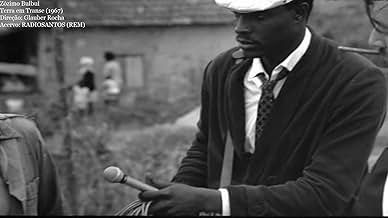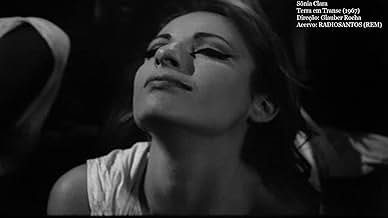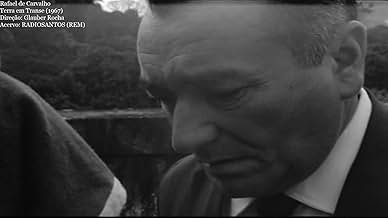VALUTAZIONE IMDb
7,3/10
3849
LA TUA VALUTAZIONE
In un fittizio paese dell'America Latina chiamato Eldorado, un poeta prova a portare un cambiamento politico, tentando di influenzare uomini importanti.In un fittizio paese dell'America Latina chiamato Eldorado, un poeta prova a portare un cambiamento politico, tentando di influenzare uomini importanti.In un fittizio paese dell'America Latina chiamato Eldorado, un poeta prova a portare un cambiamento politico, tentando di influenzare uomini importanti.
- Regia
- Sceneggiatura
- Star
- Premi
- 2 vittorie e 1 candidatura in totale
Jofre Soares
- Father Gil
- (as Joffre Soares)
Thelma Reston
- Felício's wife
- (as Telma Reston)
Emmanuel Cavalcanti
- Felício
- (as Emanuel Cavalcanti)
Recensioni in evidenza
While watching this, I kept on going back and forth between a 4 and a 4.5 before I finally settled on a 4.5. Like Rocha's "Black God, White Devil", which I watched a year or two ago, I didn't quite follow everything which went on and somewhat struggled to keep up with the plot. The more of this I watched, however, the more impressed I was with various stylistic touches such as the narration taking on a ghostly feel (the camerawork helps in that regard), various scenes appearing to occur in between Paulo's head and reality, and the film maintaining a dream-like atmosphere at numerous points. The film also captures the blindness of the masses towards accepting the false promises of political figures, and how this blind faith is a pattern which repeats itself over and over again. Thematically, it's interesting, but stylistically, it hits a number of my sweet spots really well and I definitely intend on rewatching it later this year to see if my appreciation of it goes up or down.
Released on Mr Bongo in 2005 "Terra em Transe" is dated, and has a confused screenplay, although being magnificently updated regarding the lack of ethics and the amoral behavior of the politicians. If the reader has had the opportunity of reading Machiavelli's "The Prince", you'll probably see how the behavior of politicians remains unchanged along the centuries.
However, keeping in mind that in this is movie Brazil was under a tough military dictatorship, this movie is a milestone in the history of Brazilian New Cinema. Glauber Rocha was very braze, discussing forbidden themes such as fight of classes, manipulation of the submissive masses by the elites, corruption in politician, anarchism, campaign promises not kept after the elections, economical power of foreign groups (or countries) in Latin American countries and coup d'état. In 1967, "Terra em Transe" was awarded with "Great Prize" in the Locarno Festival (Switzerland); "Luis Buñuel Prize" in Cannes Festival; "Federation of International Critics Prize" in Cannes Festival; and Best Movie of the Year in the Air France Prize, among other prizes
However, keeping in mind that in this is movie Brazil was under a tough military dictatorship, this movie is a milestone in the history of Brazilian New Cinema. Glauber Rocha was very braze, discussing forbidden themes such as fight of classes, manipulation of the submissive masses by the elites, corruption in politician, anarchism, campaign promises not kept after the elections, economical power of foreign groups (or countries) in Latin American countries and coup d'état. In 1967, "Terra em Transe" was awarded with "Great Prize" in the Locarno Festival (Switzerland); "Luis Buñuel Prize" in Cannes Festival; "Federation of International Critics Prize" in Cannes Festival; and Best Movie of the Year in the Air France Prize, among other prizes
Glauber Rocha is crazy, and here he explores his favorite subject - politics. Rocha shows, I think, that the line between poetry and politics can be blurred, and that they can and is being aproached the same way, in a sense that both dont have a definitive solution and people form different kind of theories. Glauber brilliantly potrays this paradox, and the film is a answer to the great mystery. Its a political essay as well as a cinematic masterpiece. Its poetry and psychedelic merged in to a transic account, following the same logic as in a dream. Godlike.
In the film, Glauber will prepare an analysis, seeking to reflect on the reasons that led to the 'Collapse of Populism in Brazil' in 1964. "Terra em Transe" criticizes social classes and uses 'Theory of Populism' to explain the reasons for the victory of the Coup. Rocha suggests that, the Military Dictatorship installment in Brazil after the Coup of 64', he did not believe that armed struggle would be the best way to defeat the it, because the dictatorship was becoming increasingly repressive and increasingly closed all channels of popular participation in the country's political life. So, what is the way out that Glauber points out to get Brazil out of that situation? In fact, he doesn't know and, precisely because of that, he doesn't point out any solution, he just tries to portray the complex situation with an extraordinary poetic approach.
Brazil was in a situation of impasse and that there was no solution for it at that time. It shows the vision of a political and social situation in Brazil at that historical moment, which was based on the knowledge of some aspects in the Brazilian reality at that time, as well as making it clear how the country came to this situation and what were the main dilemmas and impasses facing the Brazilian nation.
I have decides to add some qoutes at the end of my review to confirm this political thesis of the films intention:
Porfirio Diaz becomes Dictator of Eldorado and says "They will learn! They will learn! I will rule this land. I will put these hysterical traditions in order! By force, for the love of force! By the universal harmony of hells, we will reach a civilization!" Such speech well sums up the reactionary and fascist thinking of a large part of the country's ruling classes and is still very current.
Desperate with the Coup victory, Paulo insists on promoting an armed resistance, but that will be useless, as the Coup has already been victorious. He wonders how long we will endure all this suffering. Sara asks 'What proves her death' and Paul replies 'The triumph of beauty and justice'.
In the film, Glauber will prepare an analysis, seeking to reflect on the reasons that led to the 'Collapse of Populism in Brazil' in 1964. "Terra em Transe" criticizes social classes and uses 'Theory of Populism' to explain the reasons for the victory of the Coup. Rocha suggests that, the Military Dictatorship installment in Brazil after the Coup of 64', he did not believe that armed struggle would be the best way to defeat the it, because the dictatorship was becoming increasingly repressive and increasingly closed all channels of popular participation in the country's political life. So, what is the way out that Glauber points out to get Brazil out of that situation? In fact, he doesn't know and, precisely because of that, he doesn't point out any solution, he just tries to portray the complex situation with an extraordinary poetic approach.
Brazil was in a situation of impasse and that there was no solution for it at that time. It shows the vision of a political and social situation in Brazil at that historical moment, which was based on the knowledge of some aspects in the Brazilian reality at that time, as well as making it clear how the country came to this situation and what were the main dilemmas and impasses facing the Brazilian nation.
I have decides to add some qoutes at the end of my review to confirm this political thesis of the films intention:
Porfirio Diaz becomes Dictator of Eldorado and says "They will learn! They will learn! I will rule this land. I will put these hysterical traditions in order! By force, for the love of force! By the universal harmony of hells, we will reach a civilization!" Such speech well sums up the reactionary and fascist thinking of a large part of the country's ruling classes and is still very current.
Desperate with the Coup victory, Paulo insists on promoting an armed resistance, but that will be useless, as the Coup has already been victorious. He wonders how long we will endure all this suffering. Sara asks 'What proves her death' and Paul replies 'The triumph of beauty and justice'.
I have seen one other film by this guy, Deus e o Diabo na Terra do Sol, and was completely taken aback at the time: Soviet notions of montage spilled helter skelter over the sunbaked Brazilian plains into the most deranged onslaught of rigorously polemic kitsch. Marx sloganeering via Brecht filmed by Eisenstein and Welles. You either bowed our early or agreed to be annihilated in the cinematic rave.
This has more serious merit I believe, is more pensive, introspective work. Marx is puzzled over. Godard is stripped of hip and ironic complacency. Eisenstein is understood as more than blistering agitprop and in context of the new world the cinematic eye aspires to create. Is such a world worth the effort to materialize? And is it going to be as envisioned?
I recommend it on just the principle that it's a political film promoting discussion, involvement, examination. This is a rare thing to have, especially these days when film consistently shies away from the great turmoils and viewers - understandably so - are becoming increasingly bitter and desensitized to any political involvement that may change the world. Oh we keep voting, but worst of all we have come to terms that it doesn't really matter which way we do, haven't we?
No, this is political work from a time when it was still thought and anticipated that the world could be changed in one lifetime and film could be a tool to assist and herald change. The plot is about a young artist - poet and journalist - who will have to surmise his place and level of involvement in a complex narrative about a nation's past and future strife, the surrogate self of a filmmaker looking for the same.
That narrative is every bit as 20th century Latin American history has affirmed it. On one side there is flag, cross, the capital, the military-secret service complex, bureaucracy, control over state media, counter-revolution. On the other side there are workers' rights, agrarian reforms, redistribution of wealth, democracy, populism, propaganda, socialist rhetorics, the world revolution. The two sides compete for the gubernatorial elections of a fictional county called El Dorado, after the mythical 'Lost City of Gold' that obsessed conquistadors. The modern El Dorado is poor and downtrodden, its people meek and submissive, but still a coveted land for conquest and control. Oil, coal, diamonds, uranium, these are the new riches of mythical proportions.
All told, it's not really hard to discern who is the main recipient of Marxist ire here. Rocha gleefully tears through caricatures but moves on to make another point. Are the latter really ready and able to govern? Do they have a plan beyond bold proclamations? Are they backed by less insidious corporate interests?
Naturally our young poet is puzzled, having been involved with both parties. The film mirrors this inner strife: a non-linear narrative fragmented through many visual cut-ups, hand-held shots, New Wave dissonance, artificiality, internal landscape, poetry recitations, theatrical grandiloquence. Not all of it works, but it's translucent when it does.
As far as political-minded New Wave goes, I believe this has near as much merit as the films of Yoshishige Yoshida from Japan, Eros+Massacre and Heroic Purgatory.
Politics of the region are more complex and subtle than Rocha delves into. Shucks. A key insight into what this is, is the framing device: a dream of delirious death.
This has more serious merit I believe, is more pensive, introspective work. Marx is puzzled over. Godard is stripped of hip and ironic complacency. Eisenstein is understood as more than blistering agitprop and in context of the new world the cinematic eye aspires to create. Is such a world worth the effort to materialize? And is it going to be as envisioned?
I recommend it on just the principle that it's a political film promoting discussion, involvement, examination. This is a rare thing to have, especially these days when film consistently shies away from the great turmoils and viewers - understandably so - are becoming increasingly bitter and desensitized to any political involvement that may change the world. Oh we keep voting, but worst of all we have come to terms that it doesn't really matter which way we do, haven't we?
No, this is political work from a time when it was still thought and anticipated that the world could be changed in one lifetime and film could be a tool to assist and herald change. The plot is about a young artist - poet and journalist - who will have to surmise his place and level of involvement in a complex narrative about a nation's past and future strife, the surrogate self of a filmmaker looking for the same.
That narrative is every bit as 20th century Latin American history has affirmed it. On one side there is flag, cross, the capital, the military-secret service complex, bureaucracy, control over state media, counter-revolution. On the other side there are workers' rights, agrarian reforms, redistribution of wealth, democracy, populism, propaganda, socialist rhetorics, the world revolution. The two sides compete for the gubernatorial elections of a fictional county called El Dorado, after the mythical 'Lost City of Gold' that obsessed conquistadors. The modern El Dorado is poor and downtrodden, its people meek and submissive, but still a coveted land for conquest and control. Oil, coal, diamonds, uranium, these are the new riches of mythical proportions.
All told, it's not really hard to discern who is the main recipient of Marxist ire here. Rocha gleefully tears through caricatures but moves on to make another point. Are the latter really ready and able to govern? Do they have a plan beyond bold proclamations? Are they backed by less insidious corporate interests?
Naturally our young poet is puzzled, having been involved with both parties. The film mirrors this inner strife: a non-linear narrative fragmented through many visual cut-ups, hand-held shots, New Wave dissonance, artificiality, internal landscape, poetry recitations, theatrical grandiloquence. Not all of it works, but it's translucent when it does.
As far as political-minded New Wave goes, I believe this has near as much merit as the films of Yoshishige Yoshida from Japan, Eros+Massacre and Heroic Purgatory.
Politics of the region are more complex and subtle than Rocha delves into. Shucks. A key insight into what this is, is the framing device: a dream of delirious death.
I know that most people will consider this opinion as heretics, but I think this a bad movie. Despite the good cinematography and the many great actors. The script is an undevelopped and confusing mess, partially in a hurry, partially simply shallow, exceding in its chaotic expressionist improvisation. It is pretensious but lacks deepness and a more sophisticated social political critique. Dialogs are just bad. Technically, sound is also quite flawed. Edition is unjustifiably harsh sometimes, with abrupt cuts. Many scenes are partially documental, as they were shot with few actors and many extras who were indeed common people who ignored that the situation was fictious (it may work but is moral questionable). The only really good part is the small segment in which there is a kind of mockumentary about Porfirio Diaz. To resume, "Enhanced earth" is world-wide celebrated but seriously overrated.
Lo sapevi?
- QuizEldorado is a fictional country. It's entirely based on political and social issues of Brazil after 1964 while the country was under a military dictatorship that was over only in 1985.
- Citazioni
Felipe Vieira: The streets belong to the people, like the sky belongs to the condors.
- ConnessioniFeatured in Improvisiert und zielbewusst (1967)
- Colonne sonoreOtello: Overture
Music by Giuseppe Verdi
I più visti
Accedi per valutare e creare un elenco di titoli salvati per ottenere consigli personalizzati
- How long is Entranced Earth?Powered by Alexa
Dettagli
- Tempo di esecuzione
- 1h 48min(108 min)
- Colore
- Mix di suoni
- Proporzioni
- 1.66 : 1
Contribuisci a questa pagina
Suggerisci una modifica o aggiungi i contenuti mancanti






























